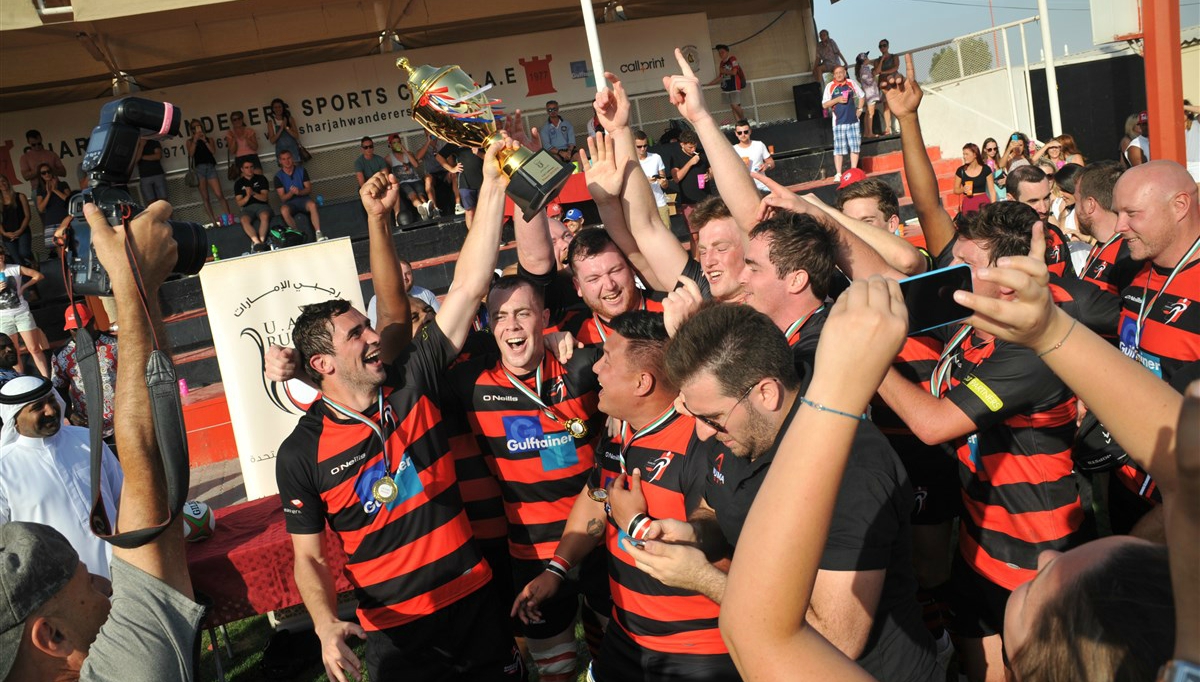
The UAE for many expats is a land of opportunity. A temporary base from which to launch a career, make enough money to then leave and set up home somewhere else.
For Rob Gough and Shane Breen, however, the UAE, moreover Sharjah, and its rugby club in particular has always been, or has become, home. Instead of making money, they have made a life and memories here. Both have been synonymous with Sharjah Wanderers Sports Club – one of the region’s oldest clubs, which marks its 40th anniversary this year.
A man who has been here for 38 of Wanderers’ 40 years is Welshman Rob Gough, who arrived in Sharjah in 1979 as a fresh-faced 21-year-old. He may have moved away from the home comforts of Barry, seven miles southwest of the capital, Cardiff, but he quickly became hooked on Wanderers and the “special” familial and community vibe that rugby famously fosters – even 3,000 miles away.
“I was working on one of the building sites and a few of my mates were playing rugby at Sharjah, so it was natural to go and play for them,” said Gough, now 57.
“It was the centre of Sharjah then as far as expat life was concerned. Just about everyone would go there whether they played sport or not. It was just somewhere you went on the weekend, you got hooked into it. It kind of got under my skin.”
Sport is always a great way to meet new people. But aside from his love of the game, the lasting friendships Gough has made through it and Wanderers is what has been at the core of his time in the Emirates.
“It’s all the friendships. You play the sport and it lasts two lots of 40 minutes with a long break in the middle. But those friendships you make last a lot longer,” added Gough, a business development manager for an oil and gas services company.
The relationships forged in his early days in the Middle East run so deep, there is a Sharjah Wanderers old boys reunion which takes place in the UK each summer.
“The guys I played with in the 1982/83 season, we’re still in touch,” Gough added.
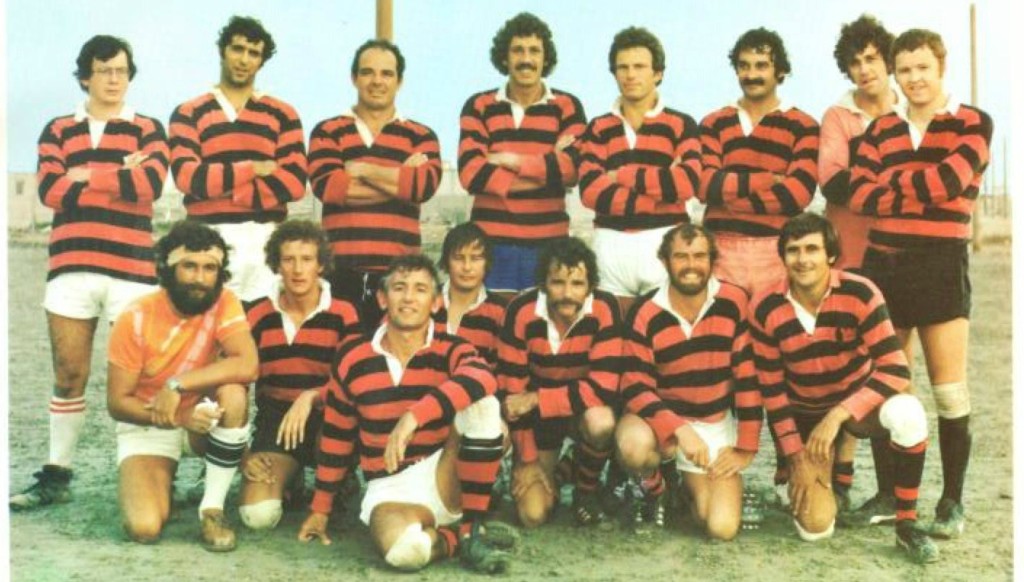
Sharjah’s first ever XV in the 1977/78 season
“There’s a Wanderers reunion each summer in the UK where you get 50, 60 or 70 people attending. That’s been happening for the last 25 years. So the friendships you make, that’s one of the highlights for me.”
The furthest Gough was used to travelling when playing back home in Wales was Bridgend – a short 18-mile drive. But when he moved to the Gulf, plane trips to Saudi Arabia, Bahrain, Kuwait, Doha and Muscat became the norm.
“That’s what Gulf rugby meant back then. There was one Abu Dhabi team, one Dubai team, a Sharjah team, an Al Ain team, Ras Al Khaimah, there was Das Island and a Ruwais club as well but to play away we’d have to travel to Bahrain, Muscat, Kuwait, Saudi Arabia and Doha.
“You’d have a weekend away every three weeks and the team spirit would be great, it’d be like a mini tour.
“Playing for Barry the furthest you’d travel is Bridgend away, so to get on a plane to Kuwait and play rugby for the weekend, it was an eye-opening experience. It always felt a bit special.”
As well as friendships formed with teammates and their families, bonds were also created with rival clubs, with home players putting their Kuwaiti and Saudi-based opponents up in their villas and vice versa.
“Opposition teams coming in would often just stay at the villas of home players and their families rather than booking an expensive hotel,” added Gough.
“The same would happen if you went away too, which helped form those bonds and friendships.
“You didn’t just turn up and play, have a few drinks then leave. Everyone got involved with fundraising. Guys were involved with construction in the early days, building roads and airports, so a lot of guys lent their skills on the weekend, building the pitches, the clubhouse.
“That would bring you together too as you’re all working together.”
Gough has fulfilled many roles at the rugby club over the years. The full-back come centre has probably played just about every position since arriving in the Emirate in the summer of 1979 – just two years after the club was established. He would go on to do his stint as chairman in the early nineties. Under his stewardship the club’s junior and women’s programmes were set up – Sharjah Wanderers’ ladies were the Gulf’s first women’s rugby team, of which his wife Sian was a founding member.
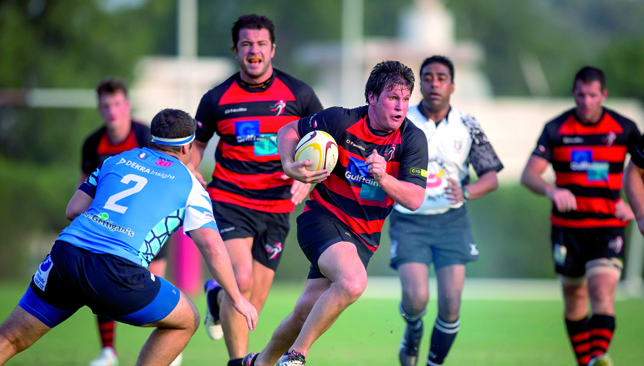
Children Seren, Tirion and Griff have all come through the ranks at the club – underpinning rugby’s reputation as a sport that provides you with a second family.
“The kids have all played for the club and my wife too,” added Gough.
“When I was chairman, rather than it being a male rugby domain, we tried to expand it. We got the junior rugby and ladies rugby going.
“My wife and the other ladies formed the first women’s rugby team in the Gulf, back in 1991/92, along with Dubai. That’s something I’m pretty proud of. I’ve been captain and chairman of the club. Most of us have. I’m still an active member of the club, I still play vets rugby.”
The all-inclusive nature of the club is something that is still very much alive today as Wanderers welcomed in their 40th year – only Dubai Exiles (1966) and Abu Dhabi Harlequins (Bats, 1970) are older.
With training numbers dwindling six years ago as the shine of Sharjah gathered dust in the shadow of Dubai’s monstrous growth since the early nineties, the future looked bleak and the club faced a tough decision. That decision was made, to switch training from the sports club to The Sevens Stadium, and Wanderers have flourished because of it.
Able to now enjoy a share of the new influx of talent coming into Dubai each summer, Sharjah have not only managed to survive, they’ve thrived – winning the UAE Conference title in March 2016, beating Jebel Ali Dragons 2nds 27-26 in one of the most memorable games played in the Emirates in recent history.
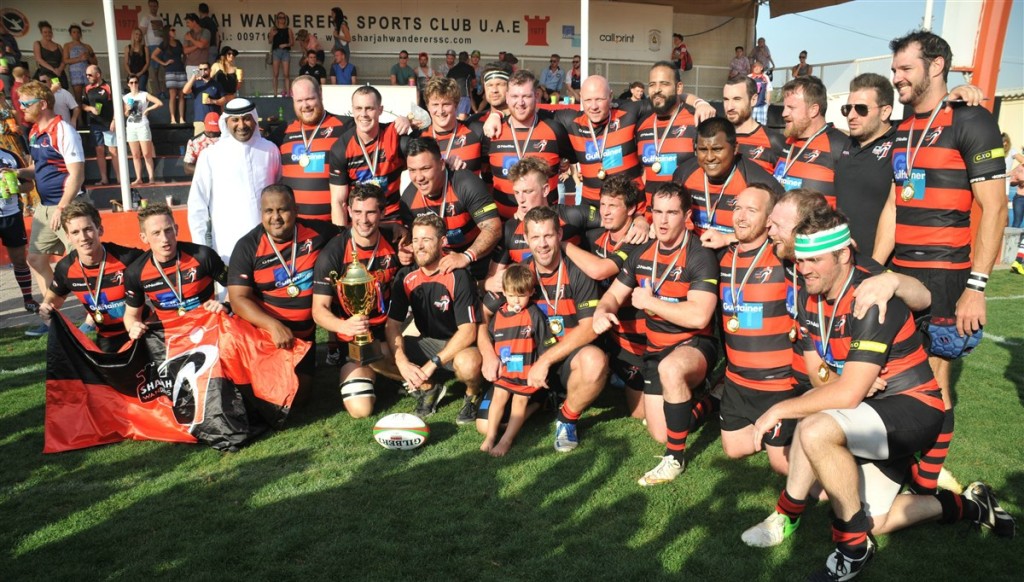
“With the rise of Dubai, the number of expats in Sharjah started to dwindle,” said current Sharjah chairman Breen, a Northern Irishman born and bred in the UAE.
“We faced the question six years ago with dwindling numbers at training and guys couldn’t get to Sharjah with traffic, so we made the decision to move training to Dubai. And we’ve been able to have 25-35 guys training regularly in the week and build a squad around that.”
It would be inaccurate to say the move saved the club, but it’s definitely helped bring in new blood.
“We’d still exist but it’s enabled us to go to a different level, by tapping into the Dubai player pool,” added Breen, 31, whose late father David had moved to Sharjah in the late 70s, around the time of Gough’s arrival.
“For us, moving to Dubai was just a requirement to keep the men’s team going at the start of the 2011/12 season.
“We could have continued training here but we’d probably be a Community League side now. We would have had good players but we wouldn’t have trained properly or been able to compete in the league like we did in the UAE Conference final a few years ago.
“We wouldn’t have been as strong as we are today. It’s just something we needed to do. Obviously that has pitfalls as we need to pay for pitch hire at The Sevens when we have a free pitch in Sharjah.
“It’s not financially beneficial to train in Dubai but like everything else, we make it work and keep everybody happy.”
Although rugby has been played through four decades at the club, Wanderers are true trailblazers.

The rapid rise of an Irish community in Sharjah has been capitalised on, with Sharjah Wanderers Ladies Gaelic Football team founded in 2009 by Claire McWilliams. They were Middle East League champions three years running from 2010-12 and a thriving men’s section has sprung up in the last five years too – a section of the club that boasts in excess of 160 members.
The all-inclusive nature of Wanderers is there in the club’s full name and Breen is delighted that rugby, football and now Gaelic football are all growing together. It’s safe to say that in its 40th year, Sharjah Wanderers has never been stronger.
“They’ve been great for the club. It’s been revitalised,” added Breen.
“It was stalling a little bit. They’ve brought a freshness to the club, with younger people coming in.
“There’s not too many rugby players actually living in Sharjah now. Out of a squad of 35 we’ve got eight rugby guys who live in Sharjah. The vast majority play Gaelic and they’ve been fantastic from starting five years ago.
“They’ve grown exponentially. They took 16 teams to the last tournament. The men’s team were promoted to the senior league last season and won a tournament.
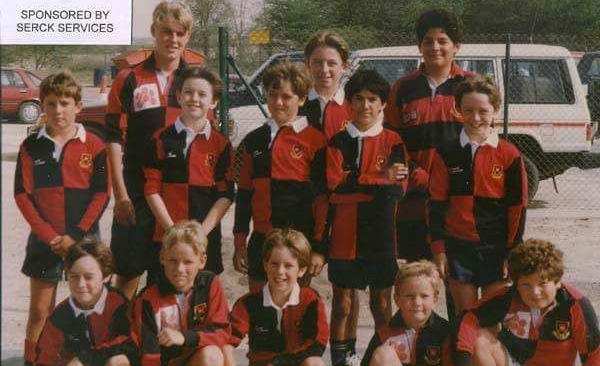
Shane Breen (bottom 2nd r) as a Sharjah youngster
“It’s definitely growing and rugby will grow alongside it. We’re a sports club at the end of the day and we support everything the sports club does, not just rugby. Rugby was the founding club that started it all but it’s definitely changed with time. It’s a good place to be.”
Like Gough, Breen has fulfilled many roles at the club. He’s been chairman for the past three seasons and still plays, filling in as replacement scrum-half in Wanderers’ 41-31 Conference win over Al Ain Amblers on Friday. He first turned out for the club aged six, dad David also made a handful of appearances upon his arrival.
Breen and his family are family friends with Dubai Hurricanes skipper and UAE international Dave Knight – the pair part of an exclusive group still playing rugby, along with Canes’ Alan Short, who grew up playing on the sand pitches of the Emirates.
Breen remembers, not fondly, lying on Sharjah’s sand pitch as a child, being put through ‘bootcamp’ style training by former coach Harry Adamson – a far cry from how the UAE’s kids are taught today.
“Harry was back for the reunion, he was my first coach,” said Breen, a valuation surveyor with Cluttons.
“He had a military background. I remember lying on the sandy pitch and the bootcamp-style training. Now it’s all tag rugby with the juniors so it’s a bit different.”
Wanderers still played on sand as recently as 2005 when a grass one was laid for the 2006 Under 19 Rugby World Championship, held in the UAE, with some games featuring in Sharjah.
“Everyone in the 80s remembers Sharjah’s sand pitch,” said Breen, although it was a far cry from RAK Rugby’s beach pitch.
“It was more septic. It was a mix of gravel, rock. If it rained the pitch would flood and it would be a mix of septic water from some leaking sewage tank, and getting a cut would sting for a month. I think a lot of people have that sort of memory of Sharjah.”